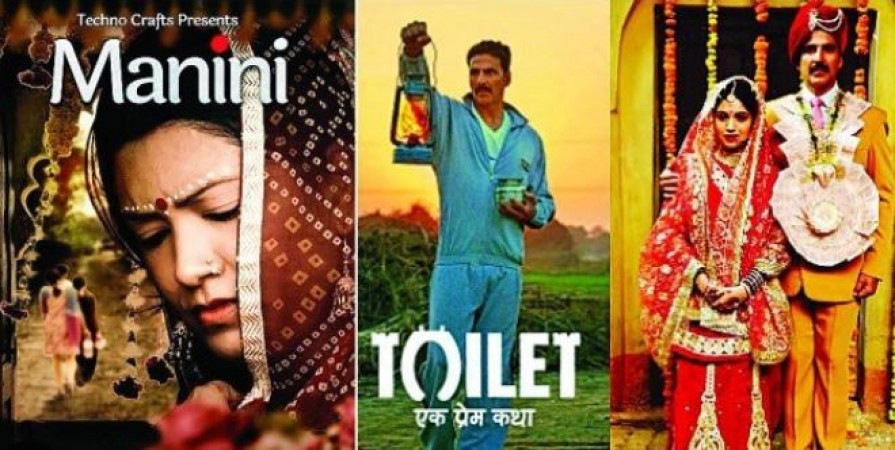
The Bollywood blockbuster "Toilet: Ek Prem Katha" sparked a legal notice from filmmaker Praveen Vyas, who is no stranger to controversy in the world of film. The documentary "Manini," which also addressed the issue of sanitation in rural India, was the source of Vyas's accusation that the film had blatantly lifted scenes and dialogue. In addition to posing concerns about creative rights and the appropriate limits of inspiration in filmmaking, this legal dispute shed light on the murky waters of intellectual property in the film industry.
It is important to comprehend the context of both "Toilet: Ek Prem Katha" and "Manini" before diving into the plagiarism allegations. Akshay Kumar and Bhumi Pednekar, two of the biggest names in Bollywood, starred in Shree Narayan Singh's 2017 film "Toilet: Ek Prem Katha." The movie received praise for the social message it delivered, emphasising the urgent need for proper sanitation facilities in rural India. It told the tale of a man who battled societal expectations and government indifference to construct a toilet in his village, with the overall objective of promoting hygiene and women's safety.
On the other hand, 'Manini,' a documentary that also addressed the issue of sanitation in rural India, was made by Praveen Vyas, a relatively unknown filmmaker. The 2016 film "Manini" sought to raise awareness of the difficulties faced by women who did not have access to proper sanitation facilities and the detrimental effects this had on their lives.
The director of the documentary "Manini," Praveen Vyas, claims that "Toilet: Ek Prem Katha" directly lifted dialogue and scenes from his film. The similarities between the two works are far from coincidental, according to Vyas, despite the fact that inspiration and influence are common in the world of film. He identifies specific dialogues and scenes that, in his opinion, were taken verbatim from "Manini."
The Female Protagonist's Struggle: One of the key parallels emphasised by Vyas is the way in which the female protagonist is depicted as struggling to gain access to proper sanitation. The absence of toilets in the homes of the female characters in "Manini" and "Toilet: Ek Prem Katha" causes them to suffer humiliation and hardship. The emotional and dramatic elements of these scenes in the Bollywood movie, according to Vyas, are very similar to those in his documentary.
Dialogues and Verbatim Phrases: Vyas also points out instances in "Toilet: Ek Prem Katha" where dialogues and even verbatim phrases from "Manini" are used. He contends that these parallels are more than just coincidental and point to an intentional attempt to copy his writing.
Visual Composition: The visual composition of some scenes is a source of debate. In order to bolster his accusations of plagiarism, Vyas asserts that some images in "Toilet: Ek Prem Katha" are strikingly similar to those in "Manini."
The creators of "Toilet: Ek Prem Katha" have vehemently denied all accusations of plagiarism made by Praveen Vyas. While both works address the problem of sanitation in rural India, they contend that there is no direct copying and that any similarities are purely coincidental and stem from the shared theme.
In effect, Vyas is demanding that "Toilet: Ek Prem Katha" be prohibited from being distributed and exhibited through the legal notice he sent out, which also asks for damages and an injunction against the movie. In the film industry, these types of legal disputes are not unusual, but they bring up important issues regarding intellectual property and artistic expression.
The conflict between "Toilet: Ek Prem Katha" and "Manini" highlights the limits of what is acceptable when it comes to borrowing ideas from other works. Although creative influence is a necessary part of the creative process, there is a thin line between being inspired and plagiarising. To ensure that their work is both original and respectful of others' intellectual property, filmmakers must carefully walk this line.
The purpose of copyright laws is to safeguard the creative and intellectual contributions of people and organisations. The script, dialogue, visual components, and other aspects of a movie are all protected by copyright. Copying or closely imitating these components without permission or attribution constitutes plagiarism, a violation of which may result in legal repercussions.
The legal dispute between Praveen Vyas and the creators of "Toilet: Ek Prem Katha" is still pending as of the time of writing. To determine whether plagiarism actually occurred, the court will have to carefully review the evidence that was provided by both parties. If the court rules in Vyas' favour, it might establish a pattern for the Indian film industry's stricter enforcement of copyright laws.
The controversy surrounding 'Toilet: Ek Prem Katha's' alleged plagiarism serves as a timely reminder of the complicated relationship between creativity and plagiarism in the world of film. Despite the fact that filmmakers frequently incorporate real-world events and other works, it is crucial to respect the restrictions on intellectual property rights. If the similarities between "Manini" and "Toilet: Ek Prem Katha" are considered plagiarism or merely a shared thematic focus, the outcome of the legal dispute between Praveen Vyas and the creators of the Bollywood hit will be decided. Regardless of the result, this case emphasises how crucial maintaining artistic and intellectual integrity in filmmaking is.
The Song That Rescued 'Roop Ki Rani Choron Ka Raja' After 5 Years